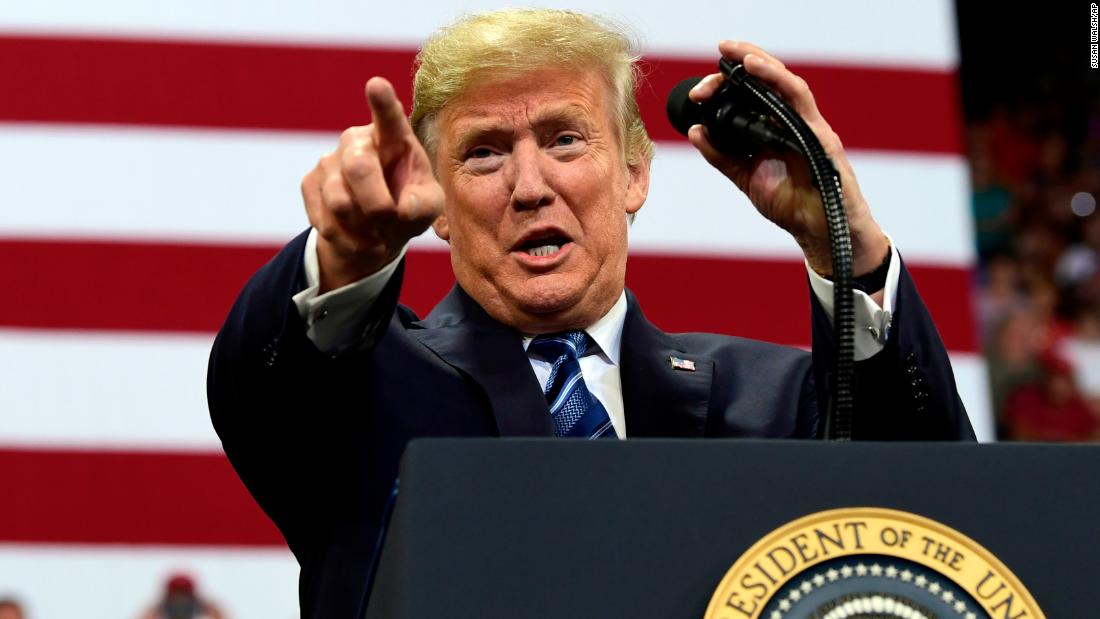
Republicans, rather, have been invoking the I-word with increasing regularity in an effort to raise the stakes for the midterm elections among their loyal voters and begin to close the enthusiasm gap with Democrats.
"It's a motivator for our base," National Republican Congressional Committee chairman Steve Stivers told reporters Friday at a breakfast hosted by the Christian Science Monitor.
The strategy takes a page from the 1998 midterm elections, when zealous Republican efforts to oust President Bill Clinton backfired on the party, resulting in an Election Day upset that saw Democrats gain seats in Congress.
This year, both parties have assessed that the idea of impeachment could once again be a bridge too far for many swing voters who will cast their ballots in the upcoming midterm elections, while possibly motivating the President's supporters to turn out in higher numbers.
This political calculation has sparked a somewhat counterintuitive dynamic: with many Democrats downplaying or rejecting the prospect of impeaching President Trump, while Republicans, including the President and his closest allies, insist his ouster is all but certain if their party loses power in Washington.
"This election is going to be about impeachment or no impeachment," the president's attorney Rudy Giuliani said last month at an event on behalf of a congressional candidate in New Hampshire.
"If it does happen, it's your fault, because you didn't go out to vote. OK?" the President warned supporters at a rally in Montana this week. "You didn't go out to vote. That's the only way it could happen."
Getting Congress on the record about impeachment
Republicans seemingly had their smoking gun when a video emerged online this week of Senate Minority Leader Chuck Schumer being asked during a parade about impeaching the president. "The sooner the better," Schumer responded in the video.
But Schumer's office afterward sought to walk back his comment, saying he had misheard the question.
"After a number of questions along the parade route about the fate of the President Trump's Supreme Court nominee, the Senator believed he was being asked, 'when will you defeat Trump,' and responded, 'the sooner the better,' noting that we need Republicans to defeat the nomination," said Matt House, a spokesperson for Schumer. "As he has said many times and continues to believe, talk of impeachment is premature, and Special Counsel (Robert) Mueller's investigation should be allowed to continue without any interference."
Nevertheless, the video was quickly pounced on by Republicans, including the campaign of Missouri Attorney General Josh Hawley, a Republican Senate candidate challenging Sen. Claire McCaskill.
"Does she, too, support impeaching President Trump?" Hawley spokesperson Kelli Ford wrote in a mass email Wednesday. "It's a question she absolutely needs to answer."
McCaskill ultimately did answer the question Thursday during a call with reporters, saying, "any talk of impeachment is inappropriate until the Mueller investigation is complete."
Montana Sen. Jon Tester went a step further during an interview with HBO's Vice News Tonight in July, dismissing any discussion of impeachment as "silly talk" that is "not appropriate at all."
"I don't think what he did is going to be an impeachable offense, if he did anything," Tester added.
Sen. Bob Casey, a Pennsylvania Democrat, believes Republicans are discussing impeachment "because they don't want to talk about the tax giveaway to the big corporations that ran up something on the order of almost $2 trillion in debt," he told CNN this week.
Instead of prioritizing investigations into the president, Casey continued, Democrats would be wiser to focus on raising the minimum wage or preventing cuts to Medicaid if they were to win majorities in Congress. "So, that's a pretty full agenda," he added.
Democrats talking impeachment
There are some notable exceptions: Billionaire Tom Steyer has bankrolled an ad blitz since last year to promote impeaching the president, and some Democratic elected officials without competitive races have been freer to float the idea.
Republicans have happily amplified those Democrats, however, believing impeachment could be a rallying cry for the GOP in a year when turnout in special elections has suggested Democratic voters are far more enthusiastic.
"Every time Tom Steyer runs an ad about impeachment, it gets a few Democrats excited," said Stivers, "but it gets a few Republicans excited too."
Public polling presents an inconclusive picture on impeachment. In a recent Suffolk University/USA Today poll, roughly 44 percent of people said the House "should seriously consider impeaching" Trump, while about 47 percent opposed impeachment. In the same poll, nearly 7 percent of respondents rated impeachment as the most important issue in the election.
Twenty years ago
But the case study of 1998 looms large for political strategists. In the lead-up to that election, most political experts confidently predicted a rout for Democrats in light of Clinton's woes. However, Democrats saw an opportunity in crisis.
"Sometimes you need a crisis, an existential crisis, to motivate you," then-Democratic National Committee chairman Steven Grossman told The New York Times in the fall of 1998.
With the roles now reversed, Republicans are dusting off the playbook that was successfully deployed against them in 1998. If the strategy would seemingly give even more attention to the controversies clouding the current administration, the GOP isn't concerned.
"The coverage of various controversies is surround sound at this point," said Michael Steel, a Republican strategist who was a senior aide to House Speaker John Boehner. "Most people have a firm view of those scandals pretty well locked in."
Democrats are also letting the drama speak for itself, not wanting to appear as though they are "rooting for dysfunction" in calling for the President's ouster, said one national party strategist.
"Voters want accountability, they don't want needless fighting and dysfunction," the Democratic strategist said. "It's a needle to thread, for sure."
Bagikan Berita Ini














0 Response to "Trump, Republicans using impeachment threat as tool to motivate their base"
Post a Comment